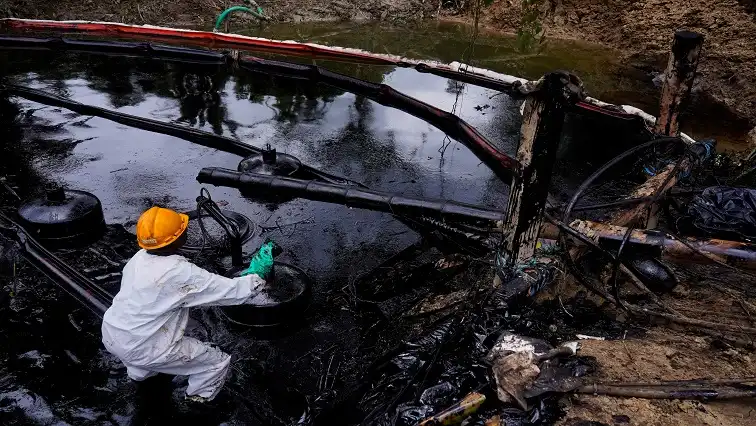A major oil spill from the Trans Niger Pipeline (TNP) has flooded the B-Dere community in Ogoniland, Nigeria, exacerbating decades of environmental degradation in one of Africa’s earliest oil-producing regions.
This incident which was reported on May 15, 2025, by an environmental rights group, marks the second disruption to the pipeline in two months, following a March explosion that triggered a fire.
Environmental Catastrophe in B-Dere
According to Nnimmo Bassey, Executive director of the Health of Mother Earth Foundation, the spill, began on May 6, 2025, and has continued to wreak havoc, with oil contaminating farmlands, waterways, and livelihoods in B-Dere.
Bassey condemned the delayed response, calling it “unconscionable” and warning of the risk of further disasters, such as fires sparked by the unchecked oil.
“We are in a disaster zone,” he said, urging the government to prioritize Ogoniland’s cleanup over new oil exploration.
Recurring Pipeline Incidents
The May spill follows a March 2025 explosion that forced a TNP shutdown, with crude temporarily rerouted through an alternative line before restoration later that month.
The pipeline’s history is marred by frequent incidents, often attributed to sabotage and crude theft.
Community and Environmental Impact
The B-Dere spill has reignited calls for justice in Ogoniland, where life expectancy is 41 years, a decade below Nigeria’s national average, due to pollution-related health issues.
The community has been in distress, with residents decrying the lack of cleanup progress and the recurring nature of spills.
Broader Implications
The TNP’s repeated failures highlight systemic challenges in Nigeria’s oil sector, including aging infrastructure, sabotage, and governance issues.
The Renaissance Group’s acquisition of Shell’s assets marks a shift toward local ownership, but the spill underscores the ongoing environmental and social costs borne by communities like B-Dere.























